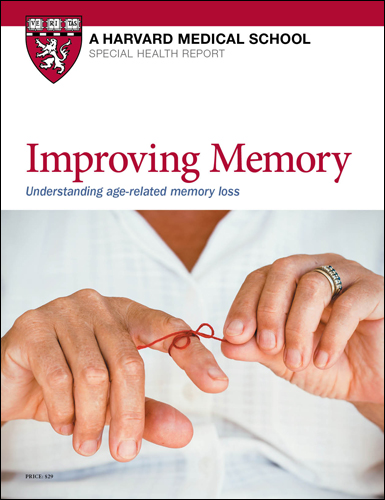Making sense of dementia trends
Medical data can seem confusing. Here's a way to understand the latest findings.

In the fight against dementia, it's sometimes hard to tell if we're winning or losing the war. Some headlines herald the news that dementia rates are declining, while others warn that the number of dementia cases is climbing fast. Here are two recent examples of study findings — and what they suggest about the risks.
Declining rates
One study, led by Harvard researchers and published online July 1, 2020, by Neurology, found that dementia incidence rates have been declining steadily since the 1980s.
The scientists analyzed seven large, long-term studies that followed more than 49,000 people ages 65 or older in the United States and Europe. The researchers calculated that the rate of new cases declined 13% per decade between 1988 and 2015. If rates continued this decline, they said, 15 million fewer people in the United States and Europe would develop dementia by 2040 than otherwise expected.
Why the decline? It could be linked to healthier lifestyles and improved treatments for atherosclerosis (the buildup of dangerous deposits in the arteries) over the past 40 years. "We treat high cholesterol and blood pressure at earlier ages than we used to, and encourage people to make healthy lifestyle changes. And anything we do that reduces atherosclerosis of the heart probably also reduces atherosclerosis in the brain," says study author Lori Chibnik, a biostatistician and assistant professor at the Harvard T.H. Chan School of Public Health.
Increasing prevalence
Despite decreasing dementia rates in the United States and Europe, another study, published online Jan. 6, 2022, by The Lancet Public Health, projected that the total number of people living with dementia is about to increase dramatically around the world.
Scientists used expected trends in certain dementia risk factors — age, obesity, high blood sugar, smoking, and education level (which also affects the brain) — to estimate the future prevalence of dementia in 195 countries and territories. They concluded that the number of people ages 40 or older living with dementia would almost triple over the next three decades, especially in African and Middle Eastern countries. This is because, globally, there will be many more people, particularly people over age 40, and an increase in unhealthy lifestyle habits (less exercise, poorer diets).
Which trend is right?
On one hand, dementia rates appear to be falling steadily. On the other, the number of dementia cases globally is about to skyrocket. How can both be true? It's because these are two different types of trends.
The Neurology study found that dementia incidence rates are falling. "An incidence rate is the amount of new cases we expect per year, per 100,000 people in the population," Chibnik says. "Our incidence rate appears to be going down — for every 100,000 people, fewer seem to be getting dementia, so the risk of getting dementia is declining."
The study in The Lancet Public Health didn't measure dementia risk; it simply estimated the total number of cases of dementia we'd see in a world with a rapidly growing population.
Two other differences: the Neurology study focused on the United States and Europe, whereas the study in The Lancet Public Health included the whole world. And the Neurology study looked backward, seeing that rates had been declining, whereas the study in The Lancet Public Health looked forward, projecting cases that might occur in the future.
What does this mean for you?
Growing older increases the chance of getting dementia. The best way to reduce that risk is to live a healthy lifestyle.
A Lancet Commission report, published Aug. 8, 2020, in The Lancet, suggested that 40% of dementia cases might be prevented or delayed with action on 12 modifiable risk factors:
- low education
- high blood pressure
- hearing impairment
- smoking
- midlife obesity
- depression
- physical inactivity
- diabetes
- social isolation
- excessive alcohol consumption
- head injury
- air pollution.
If taking on all of those risk factors seems daunting, note that other studies suggest that working on even just a few of those risk factors will help reduce dementia risk.
What you should do
Try to shift toward a healthier lifestyle gradually. Pick at least one or two of the following lifestyle factors to focus on daily:
- walk briskly for 30 minutes
- learn something new
- eat a healthier diet
- aim for at least seven hours of sleep
- limit alcohol consumption
- spend time visiting a friend (in person or on the phone)
- improve your balance (to prevent falls and reduce head injury risk)
- manage stress by practicing some form of meditation, such as yoga, tai chi, or mindfulness
- stop smoking.
And, of course, work with your doctor to treat any underlying conditions that increase your risk for dementia — particularly heart disease, high blood pressure, high cholesterol, high blood sugar, obesity, depression, and hearing loss. Believe it or not, they're all linked to dementia, even the last two.
"Maybe we can continue the downward trend of dementia rates with improved lifestyle management. If more people get better at it, I'm hopeful we'll see a change," Chibnik says.
Image: © chuwy/Getty Images
About the Author

Heidi Godman, Executive Editor, Harvard Health Letter
Disclaimer:
As a service to our readers, Harvard Health Publishing provides access to our library of archived content. Please note the date of last review or update on all articles.
No content on this site, regardless of date, should ever be used as a substitute for direct medical advice from your doctor or other qualified clinician.
















